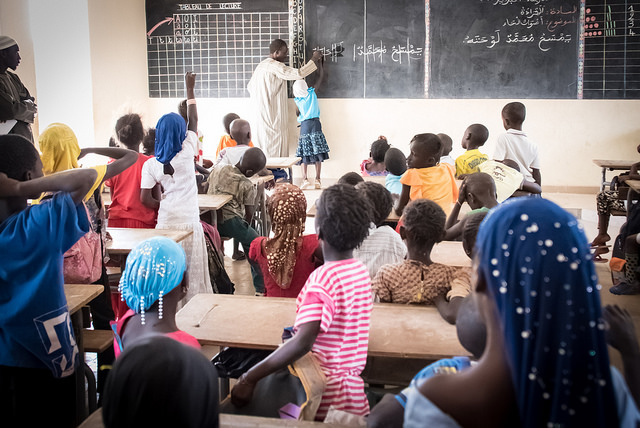A classroom in Senegal, Africa. (Photo Credit: Dana Schmidt)
At the Hewlett Foundation, every program officer is limited to one eight-year term. Mine ends this week. As I reflect on my time here, I think about those moments of doubt when I wondered if I was doing meaningful work.
It’s easy to feel removed from the real work with communities and individuals. For example, although my work at the foundation has focused on ensuring children are able to access great learning opportunities no matter where they are born, rarely does my job involve interacting with children. Instead, I engage with individuals and organizations who in turn interact with other organizations and policymakers who in turn work with teachers who then teach the children.
Don’t get me wrong—program officers work hard. We spend hours developing strategies, preparing grant information for board approval, and looking for the right organizations to support. Some of us have the opportunity to manage millions of dollars and several dozen grantees. We travel frequently. We get up early and stay up late for calls with grantees from around the world.
Despite our efforts, the fact is that our grantees are on the frontlines. They are the ones devising programs, hiring staff, influencing policymakers, and making things happen. They create the changes we hope to see in the world.
At times, it’s easy to feel like little more than a paper pusher. Sure, some of that “paper” includes multi-million dollar checks, but it doesn’t feel like it’s directly creating value for the world. Outsiders may think that program officers have infinite power to put their ideas into practice by funding other people to execute them. But even when program officers can do this, it is rarely a successful strategy. Because while someone else may implement your idea per your original specifications, if they do not own the idea themselves, they are unlikely to nurture and adapt it in the ways necessary for it to really thrive.
So what’s a program officer to do? Here are five things to remember if you’re a program officer having a similar existential crisis:
- You have the ability to leverage change broadly. Sure, you aren’t directly involved with implementing the work. You’re not directly touching the lives of 20 children in a classroom. But your efforts can create the right kind of environment to help millions of children. Distance comes with its own opportunities.
- It’s OK to be a facilitator. You’ll have to let go of some of your own ideas, because there are many people out there with even better ideas that you can help to sharpen and support. Take satisfaction in your grantees’ achievements and count them as your own—with humility, of course, since you played only a small role.
- Take time to see the work you facilitate in action. Visiting grantees and the people they support will help connect you to the work, help you understand the details, enable you to talk about it more effectively, and inform your broader strategy.
- Find other avenues to create impact. This may be through spearheading internal work at your foundation or through external volunteer opportunities.
- Step back for perspective. When change happens incrementally, it’s easy to overlook how much that adds up over the course of a number of years.
These five antidotes have kept me grounded in moments of doubt. The last one, in particular, has hit me most in recent weeks. As I’ve met with grantees for the last time as a Hewlett Foundation program officer, I’ve realized just how much has changed in the work I’ve helped support.
Ten years ago, most education research focused on how to improve school enrollment around the world. ASER, in India, was the only organization engaging citizens to understand whether enrollments were translating into learning. Today, nine countries have programs like this and four more are getting started.
These countries, individually and collectively through the People’s Action for Learning Network, have drawn attention to the fact that too many children go to school without learning how to read and do math. Their data and advocacy have catalyzed policies to respond to this huge problem. Beyond these efforts to highlight the problem, there is also new evidence about possible solutions. And thanks to the fact that learning is embedded within the United Nations Sustainable Development Goals, it will continue receiving attention over time. The conversation has fundamentally shifted.
I’ve also been involved with Open Educational Resources, which provides high-quality and openly licensed education materials for anyone to use. It is amazing to see the field grow from a group of organizations funded mostly by the Hewlett Foundation to a global movement that is increasingly bringing government along with it (in the United States and around the world).
I’m blown away by these efforts to improve learning for children. And I’m humbled by the tireless and passionate work of the grantees who helped to make it happen. Were it not for the grantees, my job would, indeed, have been little more than pushing paper. Thanks to them, working at the Hewlett Foundation has been profoundly satisfying. As I embark on the next stage of my career as a Senior Program Officer for Echidna Giving, I feel deeply grateful for what has been achieved; grateful for the people who helped along the way; and grateful for what I have learned about the role I can most effectively play in facilitating change.



